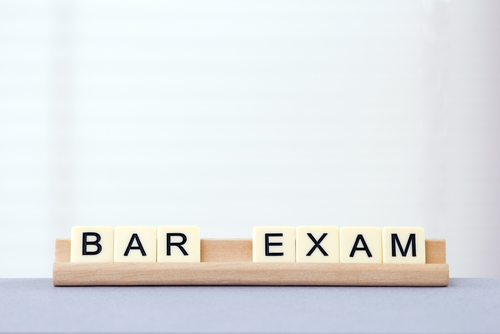California Supreme Court asserts its authority to determine passing bar exam grade

Shutterstock.com
The California Supreme Court, not a board of the State Bar of California, will determine what constitutes a passing score on the state’s bar exam.
A media advisory from the California court system says the high court amended the California Rules of Court to make it clear that the supreme court “must set the passing score of the examination.” This is a change from the usual practice, in which the state bar’s Committee of Bar Examiners set the standard, also known as the cut score. The Los Angeles Daily Journal (sub. req.) and Above the Law also reported on the change.
California State Bar Trustee Joanna Mendoza on Tuesday tweeted that a new cut score could be approved by the high court in September and applied retroactively to aspiring lawyers taking the California bar exam this month.
California courts spokesman Cathal Conneely told the ABA Journal that the high court always had these powers, which are part of the court’s inherent power to admit people to the practice of law in California. Thus, he says, this clarifies rather than changes the rules. “The new rules are meant to ensure that all committee-adopted admissions rules and procedures will be submitted to the court for review and approval,” he said.
But observers including Fleming’s Fundamentals of Law, a bar exam preparation business based in Lake Forest, California, called the change “unprecedented.”
The move comes after a serious decline in California bar passage rates raised questions of whether the cutoff score for a passing grade is too high. Only 62 percent of test-takers from ABA-accredited law schools passed the July 2016 exam, but it would have been 87 percent if California used New York’s cut score.
Twenty deans of California law schools wrote the state bar (PDF) last February asking for a lower cut score, and the bar agreed to study the issue. The judiciary committee of the California State Assembly, the legislature’s lower house, held a hearing on the subject this year.
Assembly member Mark Stone, the committee chair, said in a statement that the committee believes the new rules make sense and will help the supreme court provide the oversight required to prevent antitrust lawsuits against the state bar.
Antitrust concerns, as well as some problems in the lawyer discipline arm of the state bar, led Stone’s committee last year to study splitting the bar into a mandatory regulator and a voluntary professional organization. No split has been announced.
The high court also gave itself the power to appoint 10 of the 19 members of the committee of bar examiners, at least one of whom must be a California judicial officer. The requirement to include a judge is new. That change will take effect Jan. 1.
Updated to clarify that concerns were raised about the California bar exam passing score being too high.



